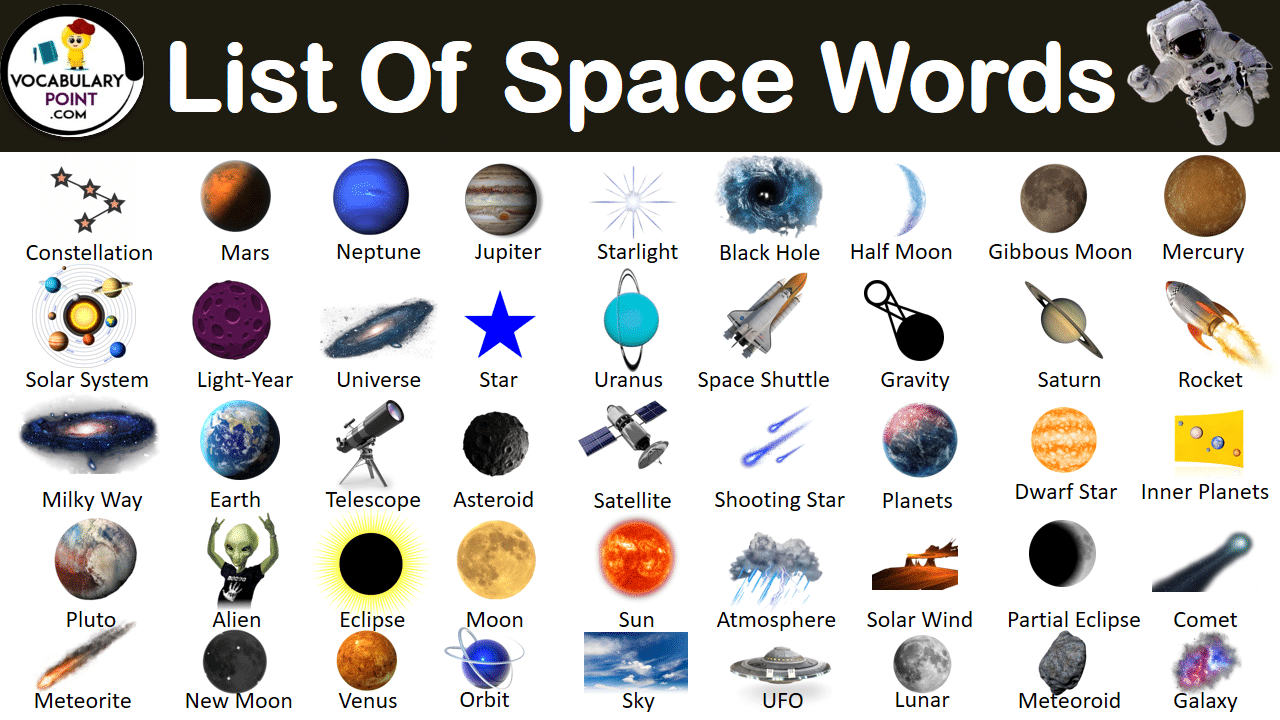Discover The Wonders Of Space: A Glossary
What is it about the cosmos that so captures our imaginations? From the swirling nebulae painted across the night sky to the invisible forces that bind galaxies together, space holds an irresistible allure, a siren song of mystery and wonder. The language we use to describe this vast expanse is just as fascinating, a lexicon filled with evocative terms that attempt to capture the sheer scale and complexity of the universe.
Consider "spaghettification," a word that conjures up a rather unpleasant image. This phenomenon, occurring near black holes or incredibly dense neutron stars, describes the extreme stretching of objects due to intense gravitational gradients. Imagine being pulled into a long, thin strand, like a cosmic noodle, your very molecular bonds strained to their breaking point. It's a stark reminder of the extreme forces at play in the universe.
| Term | Definition | Example |
|---|---|---|
| Spaghettification | The stretching of objects due to intense gravitational gradients near black holes or neutron stars. | A hypothetical spacecraft venturing too close to a black hole would be spaghettified, stretched into a long, thin strand. |
| Orbit | The gravitationally curved trajectory of an object in space. | The Moon orbits Earth, while Earth orbits the Sun. |
| Satellite | An object that orbits another object. | The Moon is a natural satellite of Earth, while communication satellites are artificial. |
| Infernal | Relating to an extremely hot or unpleasant environment. | The surface of Mercury experiences infernal temperatures due to its proximity to the Sun. |
| Spectrograph | An instrument that separates light into its different wavelengths. | Astronomers use spectrographs to analyze the composition of stars and galaxies. |
NASA Website
Orbit, a far more familiar term, describes the elegant dance of celestial bodies around one another, a ballet orchestrated by gravity. The Moon circles the Earth, a faithful companion in our celestial journey, while Earth itself waltzes around the Sun, tracing an elliptical path through the solar system. These orbital paths, governed by the laws of physics, maintain the delicate balance of our cosmic neighborhood.
Language, in all its forms, allows us to connect with the wonders of space. From the scientific precision of terms like "spectrograph," an instrument used to dissect starlight and reveal the secrets of distant suns, to the evocative power of "nebula," describing vast clouds of gas and dust where stars are born, words paint vivid pictures of cosmic landscapes. Even seemingly simple words like "moon" and "sun" carry a weight of cultural significance, woven into the fabric of human history and mythology.
The exploration of space is a journey of discovery, not just of scientific phenomena, but also of language. As we push further into the unknown, we encounter new challenges and marvels, requiring new words and phrases to capture their essence. Consider the term "retrograde motion," describing the apparent backward movement of planets in the sky due to Earth's orbital motion. This seemingly counterintuitive phenomenon, once a source of bafflement, is now understood as a consequence of our perspective within the solar system.
The sheer volume of specialized terminology in astronomy can be daunting, but even amidst the complexities, there are "cool" and accessible terms that capture the imagination. Words like "azimuth" and "parsec," "ephemeris" and "albedo," each hold a key to unlocking a deeper understanding of the universe. These terms, while specific in their meaning, also possess a certain poetic quality, hinting at the vastness and complexity of the cosmos.
The quest for knowledge about space extends beyond scientific circles. From educational resources designed to help language learners expand their vocabulary with space-themed words to popular science articles that explain complex concepts in accessible language, the beauty and wonder of space are being shared with a wider audience. YouTube videos, blog posts, and interactive quizzes offer engaging ways to learn about everything from black holes to constellations, fostering a sense of awe and curiosity about the universe we inhabit.
On April 18, 2022, "Beautiful Space," a promotional song aired on the Nick Jr. channel, celebrating the wonders of the cosmos. This simple yet evocative phrase encapsulates the profound impact that space has on our collective consciousness. It's a reminder that the exploration of space is not just a scientific endeavor but a human one, driven by a desire to understand our place in the universe and to share the beauty of discovery with future generations.
The study of space vocabulary is more than just memorizing definitions. It's about expanding our understanding of the universe and our place within it. It's about connecting with the vastness of the cosmos through language, allowing us to appreciate the intricate dance of celestial bodies, the dramatic life cycle of stars, and the endless possibilities that lie beyond our own planet. So, the next time you gaze up at the night sky, remember the power of language to illuminate the darkness and reveal the breathtaking beauty of space.



Detail Author:
- Name : Jacinto Walsh
- Email : phoebe.wiza@volkman.com
- Birthdate : 1997-04-19
- Address : 538 Olson Plains Suite 810 North Monica, DE 06418-4121
- Phone : 1-986-924-5038
- Company : King Inc
- Job : Public Relations Specialist
- Bio : Libero eos deserunt dolor magni et. Aliquid laudantium necessitatibus ut perspiciatis porro qui blanditiis totam. Iure et porro dignissimos aut. Consequatur sed saepe et non.